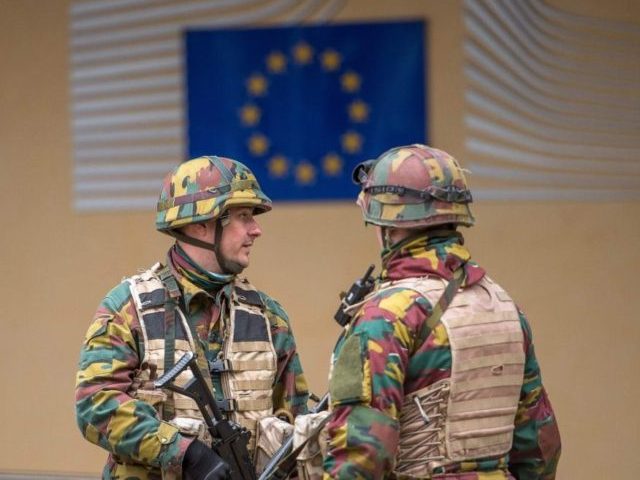A secret German defence white paper calling for the acceleration of the formation of a joint European Union Army has been leaked, revealing German ambitions to side-line NATO by creating a pan-EU force.
The paper had seen its release date pushed back until after the British referendum on EU membership, apparently over fears that it would play into the hands of those advocating a Leave vote. But a copy has been handed to the Financial Times, revealing the scale of Germany’s ambition for a pan-EU Army – led by Germany.
Germany has already taken steps to merge its military forces with those of the Netherlands, with a number of Dutch units already under German control. But the paper outlines steps to broaden this initiative, bringing the disparate national forces within EU member states under one umbrella – with Germany in charge.
“German security policy has relevance — also far beyond our country,” the paper states. “Germany is willing to join early, decisively and substantially as a driving force in international debates … to take responsibility and assume leadership”.
It argues that the EU’s defence industry is currently “organised nationally and seriously fragmented,” raising costs, preventing it from competing internationally, and making it difficult to mount joint operations.
“It is therefore necessary that military capabilities are jointly planned, developed, managed, procured and deployed to raise the interoperability of Europe’s defence forces and to further improve Europe’s capacity to act,” the paper states.
At the European level, Germany’s ministry of defence therefore wants to see joint civil-military headquarters for EU operations, a council of defence ministers, and co-ordinated production and sharing of military equipment.
However, it stresses that the changes will not threaten Germany’s “own technological sovereignty.”
The paper also takes a stance on the current debate within Germany on whether a ban on deploying the army domestically, instituted following the Nazi era, should be lifted. German troops are currently able to assist in civil emergencies such as floods, and have taken part in policing the migrant crisis, but are not allowed to deal with violence or threats of violence.
The paper argues the domestic ban should be lifted, given “the character and dynamic of current and future security-political threats”.
The thrust of the paper therefore displays a newfound confidence in German defence policy, and a new drive to take the lead on military matters within Europe.
Jan Techau, a former defence official at Carnegie Europe, said: “This is the time of a new Germany. This is probably the first time a German defence white paper is something like important.”
The paper makes no bones about Germany’s underlying mission to wrestle military power away from NATO – and more specifically from America – saying: “The more we Europeans are ready to take on a greater share of the common burden and the more our American partner is prepared to go along the road of common decision-making, the further the transatlantic security partnership will develop greater intensity and richer results.”
But critics have warned that this is merely a “dangerous fantasy” unless and until European powers are willing to put their money on the table for defence. Among the current European member states in 2015, only Britain, Poland, Greece and Estonia actually allocated the required minimum of two percent of GDP to defence spending, as stipulated in the NATO agreements.
Former UK defence secretary Liam Fox said: “many in the European project see NATO as an impediment to ever closer union.
“Their every instinct is to move towards European defence co-operation. The problem is that while they are unwilling to spend money, it is a dangerous fantasy that diverts money away from NATO.”
The white paper has been blasted by the UK Independence Party’s defence spokesman, Mike Hookem MEP, who warned that Britain would not avoid having her military sucked into the joint EU force if the British people voted to remain within the EU in June.
Speaking from Brussels, Mr Hookem said, “When you look at the command structures, logistics and forces already under EU command, it comes as no shock the EU commission has bowed to German demands for a combined EU army.”
“While we have had the EU High Command, and many other staff structures for many years, we have seen a determined push towards real assets coming directly under EU command since Jean-Claude Junker became president.”
“You only have to look at how slowly and quietly the armed forces of the Netherland’s have been subsumed by the German armed forces to see the creeping reality of how the EU aim to take over military and security structures throughout Europe.”
“It is typical of the EU to make these sovereignty threatening decisions behind closed doors, and then to gradually implement them before finally presenting the desired outcome as a fait accomplice to the people of Europe.”
“And don’t for one second think that the UK will have an opt out on this issue, as David Cameron and the traditional parties have neither the political will nor clout in Europe to defend our armed forces from becoming one part of a far-reaching European military structure.”
“However, I find it totally duplicitous and cowardly that David Cameron and the EU don’t have the guts to tell the British people of their true intentions before the referendum on 23rd June. This is an issue that not only affects our way of life but the very core of UK sovereignty.
“The only way to stop this disastrous amalgamation is for the British people to vote leave.”
His comments have been echoed by Col Richard Kemp, former commander of the British Forces in Afghanistan who, in a letter to The Times, said: “If Britain remains in the EU we will sign up to a European army no matter what our political leaders tell us today.
“The referendum will be seen as a mandate for the ever-closer union that so many are working towards.”

COMMENTS
Please let us know if you're having issues with commenting.